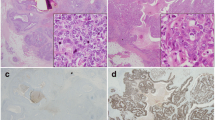Abstract
BACKGROUND: Recent studies showed that p53 and p21 may play major roles in determining tumor radiosensitivity through the apoptosis pathway. The aim of this study was to investigate the predicting value of radiosensitivity in human rectal carcinoma. METHODS: p53 and p21/WAF1 expressions in formalin fixed, paraffin-embedded, preradiation biopsy samples from 49 patients with primary rectal carcinoma were analyzed immunohistochemically. p53 and p21 expressions and their relationships with histopathologic changes after radiation and other clinical features were evaluated. RESULTS: Expressions of p53 and p21/WAF1 were 49 and 28.6 percent, respectively. In 36.7 percent of total tumors, significant histopathologic effect can be observed. There was a significant inverse expression of p53 and p21. Most of the p53(+) or p21(−) tumors were radioresistant, and the majority of p53(−) or p21(+) tumors were radiosensitive. Tumors size in the radiosensitive, p53(−), or p21(+) group decreased more significantly than in radioresistant, p53(+), or p21(−) group (P<0.01), and patients with radioresistant, p53(+), or p21(−) tumors had more local recurrence, more distant metastasis, and a shorter five-year survival rate than those with radiosensitive, p53(−), or p21(+) tumors, but without statistic significance. No statistically significant correlation can be observed between other tumor clinical features and radiosensitivity, p53, or p21 expressions. CONCLUSION: Immunohistochemistry detection of p53 and p21 expressions may be useful parameters for more radiosensitive patients selected for preoperative radiotherapy.
Similar content being viewed by others
References
Sause WT, Pajak TF, Noyes RD,et al. Evaluation of preoperative radiation therapy in operable colorectal cancer. Ann Surg 1994;220:668–75.
Holm T, Cedermark B, Rutqvist LE. Local recurrence of rectal adenocarcinoma after “curative” surgery with and without preoperative radiotherapy. Br J Surg 1994;81:452–5.
Marsh PJ, James RD, Schofield PF. Adjuvant preoperative radiotherapy for locally advanced carcinoma: results of a prospective, randomized trial. Dis Colon Rectum 1994;37:1205–14.
Lingareddy V, Mohiuddin M, Marks G. The importance of patient selection for adjunctive postoperative radiation therapy for cancer of the rectum. Cancer 1994;73:1805–10.
Fan S, EL-Deiry S, Boe I,et al. p53 gene mutations are associated with decreased sensitivity of human lymphoma cells to DNA damaging agents. Cancer Res 1994;54:5824–30.
Tsang NM, Nagasawa H, Li C, Little JB. Abrogation of p53 function by transfection of HPV 16 E6 gene enhances the resistance of human diploid fibroblasts to ionizing radiation. Oncogene 1995;10:2403–8.
Namba H, Hara T, Tukazaki, T,et al. Radiation-induced G1 arrest is selectively mediated by the p53-WAF1/CIP1 pathway in human thyroid cells. Cancer Res 1995;55:2075–80.
Lowe SW, Schmitt EM, Smith SW, Osborne BA, Jacks T. p53 is required for radiation induced apoptosis in mouse thymocytes. Nature 1993;362:847–52.
Lowe SW, Bodis S, McClatchey A,et al. p53 status and the efficacy of cancer therapyin vivo. Science 1994;266:807–10.
Xia F, Wang X, Wang YH,et al. Altered p53 status correlates with differences in sensitivity to radiation induced mutation and apoptosis in two closely related human lymphoblast lines. Cancer Res 1995;55:12–5.
Waldman T, Kinzler KW, Vogelstein B. p21 is necessary for the p53-mediated G1 arrest in human cancer cells. Cancer Res 1995;55:5187–90.
Brugarolas J, Chandrasekaran C, Gordor JI, Beach D, Jacks T, Hannon GJ. Radiation-induced cell cycle arrest compromised by p21 deficiency. Nature 1995;377:552–7.
Sinicrope FA, Ruan SB, Cleary KR, Stephens LC, Lee JJ, Levin B. Bcl-2 and p53 oncoprotein expression during colorectal tumorigenesis. Cancer Res 1995;55:237–41.
Japanese Research Society for Cancer of the Colon and Rectum. Criteria for histopathological evaluation of radiotherapy effect. In: General rules for clinical and pathological studies on cancer of the colon, rectum and anus. 5th ed. Tokyo: Kanehara & Co., 1994:42.
Remvikos Y, Tominaga O, Hammel P,et al. Increased p53 protein content of colorectal tumors correlates with poor survival. Br J Cancer 1992;66:758–64.
Tominaga O, Hamelin R, Trouvat V,et al. Frequently elevated content of immunochemically defined wildtype p53 protein in colorectal adenomas. Oncogene 1993;8:2653–8.
Tominaga O, Salmon RJ, Laurent-Puig P. Gene TP53 et cancers digestifs. Gastroenterol Clin Biol 1993;17:187–96.
Tominaga O, Hamelin R, Remvikos Y, Salmon RJ, Thomas G. p53 from basic research to clinical application. Crit Rev Oncog 1992;3:257–82.
El-Deiry WS, Harper JW, O'Connor PM,et al. WAF1/CIP1 is induced in p53-mediated G1 arrest and apoptosis. Cancer Res 1994;54:1169–74.
Bae I, Fan S, Bhatia KB, Kohn KW, Fornace AJ, O'Connor PM. Relationships between G1 arrest and stability of the p53 and p21 CIP1/WAF1 proteins following irradiation of human lymphoma cells. Cancer Res 1995;55:2387–93.
Takiguchi N, Sarashina N, Saitoh N,et al. Histopathological and roentogenological study on effects of preoperative irradiation therapy for rectal cancer. J Jpn Soc Coloproctol 1993;93:599–606.
Fukunaga-Johnson N, Ryan JJ, Wicha M, Nunez G, Clarke MF. Bcl-2 protects murine erytholeukemia cells from p53-dependent and independent radiation-induced cell death. Carcinogenesis 1995;16:1761–7.
Reed JC. Bcl-2: prevention of apoptosis as a mechanism of drug resistance. Hematol Oncol Clin North Am 1995;9:451–73.
Author information
Authors and Affiliations
Additional information
Supported by a Grant-in-aid for Scientific Research from the Ministry of Education, Science and Culture of Japan.
About this article
Cite this article
Fu, CG., Tominaga, O., Nagawa, H. et al. Role of p53 and p21/WAF1 detection in patient selection for preoperative radiotherapy in rectal cancer patients. Dis Colon Rectum 41, 68–74 (1998). https://doi.org/10.1007/BF02236898
Issue Date:
DOI: https://doi.org/10.1007/BF02236898




